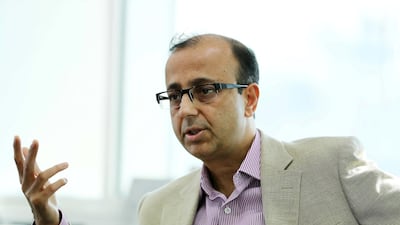Unilever, the Anglo-Dutch major behind Dove soap, expects the personal care industry's sales growth rates in the Middle East and North Africa (Mena) to slow in the next two years as the region grapples with low oil pricesand rising geopolitical tensions, a company executive said.
"Three years ago, I'd have said we're looking at growth rates of between 7-10 per cent for the Mena personal care industry," said Sanjiv Kakkar, executive vice-president of Unilever Mena, Turkey, Russia, Ukraine and Belarus, in an interview with The National in Dubai.
“Given what has happened in the region since, with the falling price of oil – historically a key driver for the economy here – we are looking at around 3-5 per cent market growth for the next two years while economies adjust to a different reality.”
Brent oil prices have declined to around US$65 per barrel from their last peak of over $100 per barrel in 2014. This has dented Middle East economies, many of which are highly dependent on hydrocarbons. Budget and job cuts in response have weakened consumer purchasing power and hit product sales, while currency fluctuations and security issues have deepened the impact.
____________
Read more:
Unilever goes ‘Made in the UAE’ with factory in Dubai
Unilever boss says look at what Trump does, not what he says
____________
“The region has gone through a lot of economic stress in the last three years,” he said. “We’ve seen much higher levels of geopolitical tensions, and we’ve also seen the Egyptian currency devalue by 100 per cent and that’s a big market, 90 million people, so it affects volumes.”
In many categories of the Egyptian personal care market, volumes dropped by 15-20 per cent in the past 12 months, Mr Kakkar said, citing data from Nielsen.
In Saudi Arabia, efforts to diversify the economy away from oil and reduce dependency on government subsidies, have hit consumer spending. The Saudi industry has seen sales volumes drop by around 6-7 per cent across a large number of categories, Mr Kakkar said, citing Nielsen figures.
Still, Mena remains one of the fastest growing regions for global consumer goods, driven by rapid population growth and relatively high per capita income.
The personal care market in the wider Middle East and Africa (MEA) region is expected to grow to US$24.39bn in 2020, from $18.05bn in 2016, with Saudi Arabia, the UAE, Iran and Egypt the biggest markets for this segment, according to research by Euromonitor International.
The UAE, the region's biggest personal care market that was worth $2.15bn in 2016 according to Euromonitor , has "not been immune from economic challenges", although the impact has not been as severe, Mr Kakkar added.
Personal care is Unilever's largest product segment, generating approximately €20.17bn or 38 per cent of total turnover in 2016.
The company, which is listed on the New York Stock Exchange, manufactures personal care brands including Vaseline, Sunsilk, and Tresemme, as well as food and beverage brands such as, Lipton, Bovril and Ben & Jerry's.
Last December, it opened a Dh1bn factory in Dubai Industrial Park (DIP) – its largest personal care facility in the region – in an attempt to capitalise on market growth.
The 100,000 square metre plant aims to export to 80 countries in the Middle East, North Africa and Europe, and targets production of 500 million items per year at capacity.
However, slower market growth in the years since plans for the factory were conceived must be taken into account when setting goals, Mr Kakkar said.
“The Dubai Personal Care factory was set up in response to strong long-term potential in the Mena region for personal care products,” he said.
“We have the benefit in this region of countries that are at the higher end of per capita income, like the UAE and Qatar, and we have countries like Egypt, Sudan, Algeria and Morocco, which are still emerging markets in terms of personal care consumption. So there is great potential.
“But we’ve got to keep [current market conditions] in mind when we set our expectations in future.”
Mr Kakkar said the group is investing heavily in Mena and plans to expand and upgrade facilities as required over the coming years. However, there are no large-scale schemes or entries to new markets planned at present.
Unilever reported lower-than-expected global sales for the third quarter of 2017, whichfell by 1.6 per cent to €13.2bn, hurt by a 5.1 per cent hit from foreign exchange rates, the company said.
It also blamed poor weather in Europe, the US and Mexico for disrupting its sales, and increased competition from Asia and other emerging markets.

